
16 minute read
Rishi Sunak – all pain, no gain?
The elevation of Rishi Sunak, with his African and Indian origins, as Britain’s first non-White Prime Minister has been a matter of pride to Africa, but are his policies out of touch with the needs of the UK’s common people as they struggle with the cost of living crisis?
Sunak policies – a lot of pain for very little gain?
Advertisement
The Global Perspective
By Lord Peter Hain
When Rishi Sunak became UK Prime Minister in late October, there was a sigh of relief from most people in Britain – whatever their party allegiance – because he wasn’t Liz Truss. Indeed he had predicted her disastrous few weeks in 10 Downing Street, when the British economy tanked, home mortgage rates rocketed, the fi nancial markets and the International Monetary Fund were spooked and the Bank of England was left shaking its head in disbelief.
Indeed, Sunak was seen as ‘a safe pair of hands’ economically, and the markets recovered a little from their Truss nadir.
Nor was he Boris Johnson tearing up an international treaty he’d signed on exiting the European Union on Northern Ireland, partying during Covid whilst locking down everyone else, and prompting people abroad to wonder whether the UK had lost its marbles.
There was also a frisson at having the UK’s fi rst-ever British Indian (via East Africa) Prime Minister – elected by the Conservative Party with its racist heritage, of all things.
So what to make of him? Let’s start with Brexit which he enthusiastically backed – and still does, despite all the evidence. In the 2016 Brexit referendum, Sunak preached a mantra of ‘taking back control’.
Harking back to long-gone imperial glory, he and other Brexiteers persuaded enough voters that their economic insecurity and alienation was all down to being ‘dictated to by Brussels’. Once the country could break free from these dastardly foreigners, ‘British sovereignty’ could be reincarnated, and all would be well, they preached.
Monumental act of self-harm
In fact, Brexit has proved a disaster – and not just by destabilising the peace process in Northern Ireland, or boosting support for independence for Scotland. It triggered a 5% collapse in GDP,a 14% fall in investment and a similar fall in physical trade compared to what would have been the case had Britain not left the European Union. All this caused because of sudden barriers put up against the biggest, richest single market in the world, accounting for fully half of all UK trade in goods.
This monumental act of national self-harm also meant that Britain was worse placed than other G7 countries to withstand the global turmoil following Putin’s invasion of Ukraine: rocketing energy costs, accelerating infl ation, soaring food costs and rising interest rates. Britain is the only G7 economy not to have returned to
pre-pandemic GDP levels. This is the tough legacy Sunak has inherited – but it is also one he helped create. And as a result his fi rst budget (17 November) has been a fi stful of tax rises and public spending cuts.
Moreover, he faces the reality that Truss’s fantasy economics meant that overnight, the Tories lost their cherished claim to being the party of ‘sound money’ and competent economic management.
Her humiliating demise also exploded the delusion that Britain could build a low-tax-small state – ‘Singapore-on-Thames’, once more ‘in charge of its own destiny’, freed from European or other foreign economic constraints. The global fi nancial markets, panicking at the recklessness and fearing the UK economy was going down the drain, eff ectively ‘took back control’ and sank her.
But Rishi Sunak has long been a signed-up supporter of that neoliberal agenda of low taxes for the well-off , a small state (little participation by government in investment or economic activity) and low public spending. This approach produced the terrible Conservative record of growth since 2010 when they took power; this was something that Liz Truss did at least get right when she condemned that dismal growth rate.
Sunak began his fi rst budget as Chancellor of the Exchequer in
March 2020 by claiming that the British economy was robust, its public fi nances sound and its public services ready for the imminent Covid threat. He ended it by announcing £6bn of new funding for the NHS and by claiming that ‘The Conservatives are the party of public services.’
Decade of Tory austerity
What he didn’t say was that the preceding decade of Tory austerity (which he backed) had seen public spending cut by £180bn in today’s terms. Hundreds of thousands of public service jobs were lost, and public service standards were badly damaged, creating massively longer health service waiting lists and waiting times for medical appointments
Below: Britain’s new Prime Minister Rishi Sunak on a visit to the Advanced Technology Centre at The Fylde College, Blackpool
as well as real cuts in education.
The Institute for Fiscal Studies has shown that government departments endured steep real falls in their day-to-day budgets since the Tories took offi ce in 2010. These include Housing and Communities (where Sunak was Housing Minister in 201819), down 62%; Work and Pensions, down 50% and Transport, down 37%. In 2021 Sunak also broke a pledge in the 2019 Tory election manifesto by cutting Britain’s foreign aid budget below the UN-backed target of 0.7% of national income.
Yet even before the Covid pandemic or the Russian war on Ukraine, none of the Tory targets for cutting budget defi cits and bringing down national debt as a share of GDP were ever hit. So, plenty of pain for precious little gain.
Sunak did take some useful measures to protect the UK economy from the worst consequences of Covid, notably his furlough scheme whereby the government helped employers to keep their workforces together and pay their wages while businesses were closed or working well below capacity.
He introduced signifi cant fi scal support for the economy in 2020 but planned to withdraw 90% of it by 2022. Under pressure, he provided extra support for vulnerable people on welfare benefi ts, but promptly cancelled it without regard for the families for whom it was a lifeline.
Such decisions help explain why so many critics of Rishi Sunak fear that his career as a wealthy hedge fund manager and his wife’s family fortune have left him out of touch with the diffi culties facing ordinary people as they struggle to get by. His boast during the Tory leadership election of August 2020, that he had diverted funds away from deprived urban areas to middle-class rural towns adds weight to this concern.
On foreign policy, Sunak deserves praise for reversing Truss’s crass decision to follow Donald Trump and move the British embassy to Jerusalem. Just as well, with Israel under the returning Benjamin Netanyahu, ‘on the verge of a right-wing, religious, authoritarian revolution, whose goal is to decimate the democratic infrastructure on which the country was built,’ as the Israel newspaper Haaretz recently put it.
But there’s no sign he will chart a progressive foreign policy. After all, he has defended the Conservative record since 2010 when they came to power – and for over half of that as a member of its government.
With the Labour Party’s Keir Starmer now seen as PM-in-waiting, with his party riding high upon big opinion poll leads, Sunak has his work cut out not to follow Liz Truss as one of the UK’s shortest-serving Prime Ministers.
Lord Hain is a former antiapartheid leader and UK Cabinet Minister. His new thriller, The Elephant Conspiracy, was recently published by Jonathan Ball
HAViNG WOMEN CREATiVES PARTiCiPATE EQUALLY iN THE AFRiCAN ECONOMY iS NOT JUST A MORAL iMPERATiVE, iT MAKES ECONOMiC SENSE.

The future is here and African women are leading…boldly, unapologetically and dynamically. There’s no stopping the females on the Keep Walking Africa’s Top 30 List presented by Johnnie Walker in collaboration with Trace Africa. Who are these women, why do their stories matter and how does their influence blend into the African continent’s economy? Let’s find out…

Sungi Category : Art
Award-winning whisky brand, Johnnie Walker powered by Trace Africa, presented the Keep Walking Africa Top 30 list earlier in 2022. Together, they’ve taken strides to honour cultural shapeshifters in Africa who are boldly striding with a big purpose in music, arts, fashion, media and film. These Top 30 creatives have one thing in common which is knowing that movement is the first step towards progress. However, that’s where the similarities end. On close inspection, The Keep Walking Africa’s Top 30 list tells another narrative which explores the transformative power of women in creative spaces.



As Tanzanian visual artist, Sungi Mlengeya, shares, “The art I make is inspired by my life, where I grew up and the women who surround me. Whatever our journeys, accomplishments, struggles and relationships, I am drawn to uncover or just marvel over the nuances of our existence.”
Sungi’s paintings are often depicted by striking monochromatic compositions. They explore the themes of self-discovery as well as empowerment of black women. Her goal through her art is to dispel patriarchal myths of female weakness.
Like most women on the Keep Walking Africa Top 30 List, Sungi’s bold steps with a big purpose have garnered global attention and has led to promoting social justice. “Art is very powerful and I did not understand the extent of this until recently. I have witnessed a surge of people sharing my work in the height of the Black Lives Matter movement following the racist incidents that have occurred. When I started painting it didn’t feel a lot like activism, it was natural for me to be inspired by and depict people that surround me in my community, people who are black. The art world is very global now with the internet and social media, what I paint can be viewed by someone on another corner of the world, and this can be a person of colour who feels underrepresented in their community. They feel portrayed in my work. Knowing this has given more meaning to my art, that it could be touching more lives than I can imagine and playing a role in bringing about the change that we need,” tells Sungi.
Desiree Category : Music
Another strong theme that comes through the Keep Walking Africa Top 30 is representation. For DJ Desiree representation matters as she states, “[I’m a] Black South African intersex woman. I weigh very little on the privilege scale. The odds are stacked against me yet here I am pursuing my dreams and turning them into something fulfilling.”
Desiree has swiftly moved from obscurity to being one of South Africa’s most promising house music DJs. She began creating eclectic house and techno sets inspired by her African heritage. However, it’s more than just music that makes Desiree stride boldly. She’s determined to represent marginalised women and queer communities in the creative industry too.
She created a start-up called the Boy’s Club which is an initiative that seeks to empower marginalised femme DJs. “Myself and two other amazingly talented DJs (that identify as women) started Boys Club to try to mitigate [misrepresentation]. We’re hoping to alleviate this misrepresentation by hosting events, workshops, conferences and other projects that prioritise and put women DJ’s at the forefront,” she explains.
Evelyne lly Category: Film
The next-gen African women are relentless when it comes to challenging the status quo and making sure that women are a part of all creative conversations. In Côte d’Ivoire, filmmaker and actress Evelyne Ily, is challenging the stereotypes of women in the film industry through her production company Yevedi. She’s promoting women to take roles behind-the-camera and try their own hand at being a producer. After spending years learning the art of storytelling for film, Evelyne holds regular workshops, campaigns and fundraisers to educate and assist younger women in doing the same.
Lafalaise Dion Category: Fashion
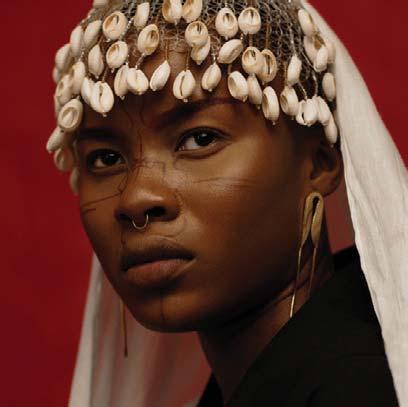

Not too far away from Evelyne is another strong woman striding to tell stories in the fashion industry using Cowrie shells. Enter Lafalaise Dion, better known as the Queen of the Cowries. As a designer and visual creator, Lafalaise connected with her traditional heritage to express herself and by doing so has shaped fashion and art on a global stage.

As Lafalaise says, “My [Cowrie] pieces are an extension of me, they are the representation of me. They are inspired by my ancestors and my culture.I love hearing the [Cowrie] shells clinking while and after [creating] a piece. It’s like little melodies or whispers coming from forefathers and foremothers blessing the person who will wear it with guidance, protection and presence.”
Cowries are more than just mere shells in Africa. They represent wealth, power and strength plus have served their purpose as monetary currency on the African continent. For Lafalaise to use Cowries in her fashion works is almost akin to activist expressionism. Adds Lafalaise, “The activism of my work resides in many aspects. From the use of Cowrie shells as a primary material, to the freedom I embrace in unapologetically expressing myself as a young Black African woman – not only through spoken words but also through written words recorded for posterity.”
For many female creatives on the African continent, this is only the beginning. Women are unlocking new opportunities, taking non-traditional paths and seeking ways to contribute to both their community and economy. As Adrian de Wet, House of Walker Partner & Emerging Markets, tells, “Our intention for the Keep Walking Africa Top 30 List is to not only recognise them but to be an inspiration to all African creators to take bold steps in shifting the continent’s culture, especially as the world re-opens after lock-down.”
Lafalaise, Evelyne, Desiree, Sungi and many other women on the Keep Walking Africa Top 30 are all using their talents to unapologetically express themselves and by doing so are also birthing stronger next-gen women creatives. The future is indeed female.
Adrian de Wet House of Walker Partner & Emerging Markets
Read more about the Keep Walking Africa Top 30 creatives on AFRiCATOP30.TRACE.TV
Sou Source List : e L Lisistt : Bubblegum Club, Something Curated, Front Row Media, Unit London, Toast Blog and IOL.co.za Johnnie Walker in collaboration with Trace Africa presents the Keep Walking Africa Top 30 Round Table Show. Munya Chanetsa hosts the Round Table Show and discusses the Top 30 who are taking bold steps with a big purpose. He is joined by the guest panellists and together they dive into what makes the Top 30 so phenomenally bold. They cover the landscape of the creative industry in Africa, the challenges, the successes and the future of the next-gen creators.

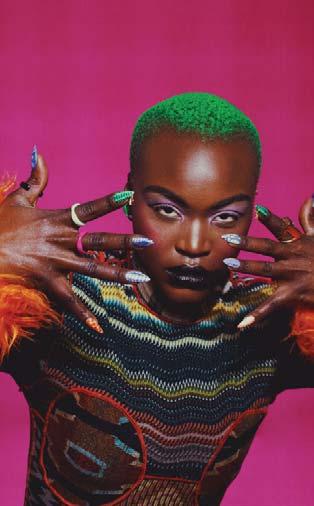

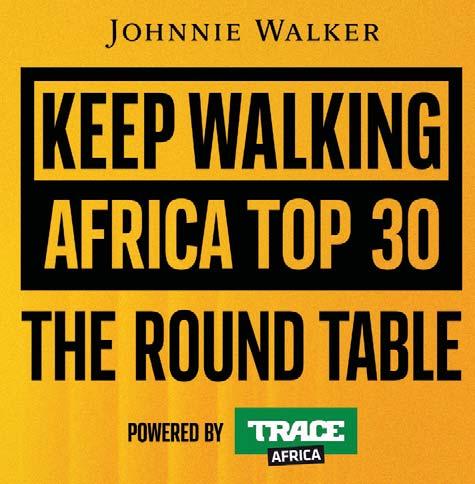


In Conversation Samuel Awuku – Director General, Ghana National Lottery Authority Ghana’s National Lottery Authority (NLA) which operates the country’s hugely popular lotto, is celebrating its 60th anniversary.DG Awuku (right) outlines its path to success. Aim is to make NLA the biggest lottery on the continent





When and how did lotto come to Ghana? National Lotteries, with a mandate to or is named after him. tion of the Daily Graphic, travel arrangements to attend the event its earlier incarnation as a civil service Lotteries) and has been transformed into generation. elled to Côte d’Ivoire, Nigeria and Morocco. to the Ivoirians, Nigerians, Tanzanians and a delegation from Niger. member of the African Lotteries Associa tion. NLA has also won the bid to host the African Lotteries Association Conference 60th
The 60th The three months of activities will be cli teries Association, will join NLA to celebrate What are the Authority’s key values today? How important is the role of NLA in supporting the country’s development? The National Lotto Act mandates the NLA dren.
NLA is one of the critical reve nering government in several NLA is seeking to generate more towards the nation’s ries listed above.

Ghana National Lottery Authority





What have the achievements been in the digitisation process so far? sectors. We believe that with the agenda of digitalisation to trans Technologies Ltd., which has been driving this agenda and seeking to modernise its activities with new contracts and new arrange and vision.

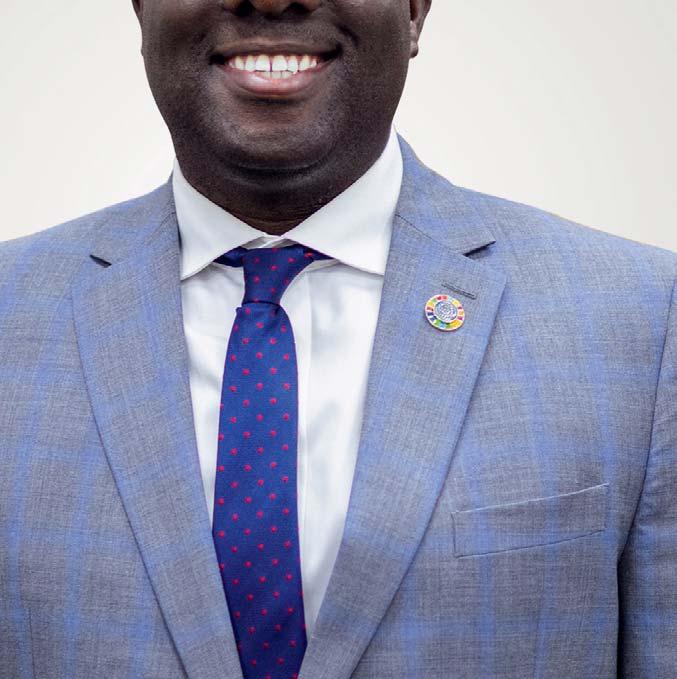
Tell us about the Good Causes Foundation. Arts. tions. . tions and engage in similar activities. We Are there other major objectives for NLA in the medium term? The major objective is for the NLA to take
The vision is to see the NLA rivalling
Another challenge that bedevils NLA is nated the market. ¢ ¢ ¢ of the law. NLA is working on establish Finally, what have been your major achievements as DG in your short administration?
Leading an image rebranding of the their conditions of service and were in ter several meetings and negotiations effect, hard work is rewarded. management and staff, getting them to ¢ ated a better deal for the NLA to get a dends to the government, as described above.


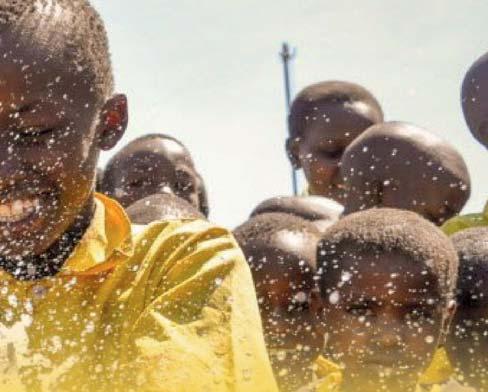
Ghana National Lottery Authority
In Conversation Alex Dadey – Executive Chairman, KGL Group KGL Group is a wholly-owned Ghanaian group of companies, with interests in technology For NLA, the tide has turned and a bright future awaits
In just about three years, KGL has become a key player in the Ghanaian economy. What accounts for your success? ated on both sides of the Atlantic and in several others. been dealing with over the three decades Tell us about your partnership with the government in its digitalisation drive, and your partnership with NLA.

What has been the impact on the NLA of its partnership with the KGL Group? well for the NLA.
How important is the role of a National Lottery Authority in a developing economy? th This section was coordinated by Top
Reports – International Communications Agency.










